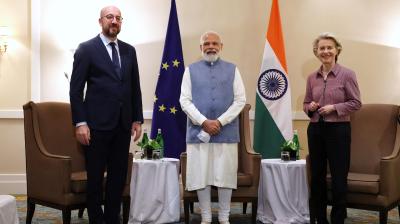Dutch semi-conductor interests in Asia
Clingendael’s Alexandre F. Gomes and Maaike Okano-Heijmans contributed a chapter on Japan in the report 'Dutch semi-conductor interests in Asia'. Clingendael Research Fellow Sense Hofstede authored the chapter on Singapore, in a personal capacity. The report is published by the Leiden Asia Centre, an independent research centre affiliated with Leiden University.
A semiconductor is a material that allows for a certain level of electrical conduction, but the term often refers to computer chips (also known as integrated circuits (IC) or microchips). The Dutch semiconductor sector has many connections with companies, research institutes and official organisations in South and East Asian countries. These connections can be subject to any politicisation of the industry, creating both political and economic risks and opportunities for the Netherlands. Semiconductor devices (or microchips, integrated circuits or computer chips), to which the word ‘semiconductor’ refers in this study, are crucial for future technological and economic developments, as well as the transition to green technologies. Securing a sufficient supply of chips is therefore essential, while dependencies in the sector are used as political tools.
However, while the impact of US restrictions on Dutch companies as part of the US–China rivalry has been extensively analysed publicly, a clear overview of Dutch interests in the semiconductor industries in South and East Asia is lacking, as is analysis of how these interests are affected by general politicisation of the sector. This report therefore analyses the interests and connections of the Dutch semiconductor sector with companies, research institutes and government organisations in China, Taiwan, South Korea, Japan, Singapore and India. The report aims to answer the question: What are the interests of the Dutch semiconductor industry in South and East Asia in light of the politicisation of the sector?
Structure
After chapters on the Dutch semiconductor industry and relevant policies in the United States and the European Union, the report further consists of country chapters that discuss the composition of the semiconductor industry in each country and their connections with the Dutch sector. The case studies consist of the following countries:
- China (Tycho de Feijter and Jonas Lammertink)
- India (Dr. Chaitanya Giri)
- Japan (Alexandre F. Gomes and Maaike Okano-Heijmans)
- Singapore (Sense Hofstede)
- South Korea (Jonas Lammertink)
- Taiwan (Tycho de Feijter)
The report's conclusions gather and compare the findings of the individual country chapters and link these back to the research question and wider context. The conclusions will analyse how the Netherlands and Europe could position themselves regarding the politicisation of the semiconductor sector in South and East Asia.
Japan
Alexandre F. Gomes and Maaike Okano-Heijmans
This country chapter is part of the report “Dutch semiconductor interests in Asia. The politicisation of the Asian semiconductor industry”, which you can read here.
Since its creation in the 1960s to today, the Japanese semiconductor industry has gone from a gradually rising industry to global leadership, into decline and – most recently – towards renewed growth. The Japanese government has played a significant role in each of these phases, both through domestic industrial policies for growth and through concessions to the United States that led to the sector’s decline. Today, Japanese government involvement is largely driven by economic security concerns and, more specifically, by a desire to ensure the secure and stable supply of semiconductors and the materials needed for their production. The Japanese government has labelled semiconductors as a critical component for the development of new leading-edge technologies.
This chapter presents the state of play and latest trends of the Japanese semiconductor industry, as well as key government policies. It reflects on implications for the Dutch semiconductor sector and government, and highlights opportunities and challenges for collaboration. The analysis suggests that the Netherlands and Europe can learn from Japan’s clarity about strategic objectives, which serves as a powerful driver for Japanese stakeholders in the semiconductor sector and beyond to act proactively and jointly.










